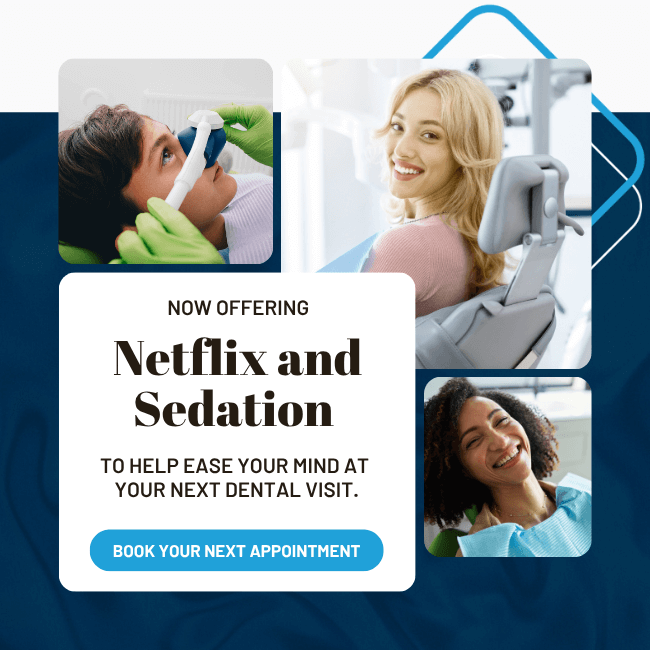You probably already know that flossing and brushing are important habits that promote healthy teeth and gums. Flossing helps remove debris that cannot be cleaned away by a toothbrush, and also helps prevent gum disease.
But what’s the best time to floss, before or after brushing? The Canadian Dental Association recommends flossing before you brush, citing it as a better prevention technique against gum disease and tooth decay. Floss at least once a day and brush your teeth with fluoride toothpaste twice daily, ideally after every meal. If flossing feels difficult, there are ways to make it a more enjoyable habit, even for kids.
The Importance of Flossing
Flossing helps remove plaque and bacteria. Plaque build-up can lead to gum disease, a condition that affects 7 out of 10 Canadians at some point in their lives. While the early stages of gum disease may not be noticeable, over time, it can turn into a serious condition. Untreated gum disease is a significant cause of tooth loss in adults.
Gum disease happens when plaque builds up at the gumline. If this plaque isn’t cleaned away by flossing and brushing, it hardens into tartar, which can only be removed by a professional. Therefore, prevention through proper oral hygiene is key to preventing gum disease.
If you brush your teeth but don’t floss, you miss out on cleaning one-third of your tooth surface. So, flossing isn’t just a positive habit, it’s an essential one.
Flossing Tips
While flossing and brushing are important, many people find the routine tedious and challenging. Here are some tips to help make flossing and brushing more accessible and enjoyable.
Floss Before You Brush
The Canadian Dental Association recommends flossing before you brush. If you brush first and then floss, the debris you remove through flossing may stay on your teeth. But if you floss first, the debris you remove through flossing can then be brushed away by your toothbrush and toothpaste.
Choose the Right Floss
There are many types of floss on the market for different needs. For example, people with braces or those with larger gaps between their teeth may find dental tape helpful. Meanwhile, standard nylon floss may be ideal for those with narrower gaps between their teeth.
Other types of flosses are specially designed for people with dental appliances like braces and bridges. Ask your dentist what products they recommend for your specific dental characteristics.
Consider Water Flossing
Some people find a water flosser like the WaterpikTM easier and more pleasant to use. A water flosser issues a stream of water through your teeth to clean out debris and plaque. It can be effective for those with braces, bridgework, implants, and crowns, or those with hard-to-reach spaces between their teeth. People with mobility conditions may also find water flossing more accessible.

However, water flossers are more expensive and may not remove all food debris. Many dental professionals see water flossers as a complement to traditional flossing, not a replacement. So, consider using traditional floss first before using a water flosser to flush out debris.
Tips for Kids
Teaching kids how to floss at an early age can instill a healthy habit for life. You can encourage kids to floss by:
- Making the process fun: For example, you can hum a song from start to finish while you and your child floss. Like singing “Happy Birthday” twice during handwashing, this ensures you both spend enough time on your teeth.
- Setting a good example: Because kids often like to imitate the adults around them, be sure to let your child see you brushing and flossing regularly. This habit benefits you too!
- Including it in routine: Help your child stay consistent by integrating flossing and brushing into their bedtime routine, along with other tasks like storytime or putting on pajamas.
Get Regular Dental Check-Ups
Flossing and brushing are important, but so are regular professional check-ups with your dentist. These visits can help spot a problem early, preventing costlier and more uncomfortable treatments later on.
In general, many people benefit from a dental visit every 6 months, but how often you should visit your dentist depends on your unique dental health needs. Ask your dentist for their professional recommendation.
Dental Care & Education in NW Calgary
Preventive dental care is core to our philosophy at Montgomery Dental Centre. That’s why we’re passionate about teaching our patients how to effectively floss and brush. Check out our patient education videos to learn how to take better care of your teeth.Our team at Montgomery Dental Centre offers a wide range of dental services in the NW Calgary area, including children’s dentistry, emergency dentistry, cosmetic procedures, and more. With team members who speak English, French, Hindi, and Punjabi, we want to be accessible to and supportive of everyone who walks through our door. Contact us to book an appointment today!




